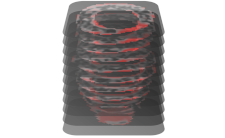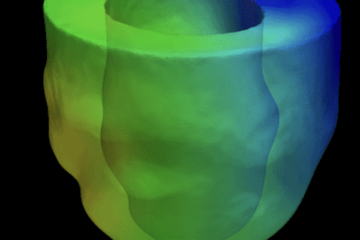ADVANCE Professors Win $1M NSF FDT-BioTech Grant
From the press release:
The U.S. National Science Foundation, in collaboration with the National Institutes of Health (NIH) and the Food and Drug Administration (FDA), has awarded over $6 million in research funding across seven projects to explore the development of digital twins, dynamic virtual representations of physical objects or processes, for use in healthcare and biomedical research.
…
“Digital twins have the potential to remove common medical risks involved in patient monitoring and treatment, providing a framework for optimal decision-making,” says Yulia Gel, program director in the NSF Division of Mathematical Sciences, which leads the FDT-BioTech program. “Real-world use of these complex models could streamline clinical trials for safer development of drugs and medical devices.”
The ADVANCE project entitled CARDIT: Cardiac Digital Twins; but better, led by PI Mauro Maggioni, was awarded $997,770 over three years. Professors Dimitrios Giovanis, Somdatta Goswami, and Natalia Trayanova are Co-PIs on the project.
Further information on the ADVANCE project to which the grant was awarded can be found on the NSF site. The abstact follows:
Sudden cardiac death (SCD) remains a leading cause of mortality worldwide, with an incidence ranging from 50 to 100 per 100,000 people in the general population of Europe and North America. SCD accounts for 15-20% of all deaths. Despite advancements in medical science, accurately assessing the individualized risk of SCD remains a significant unmet clinical need. Digital twins of hearts offer a powerful tool for personalized medical care, enabling data-informed decision-making under uncertainty, that is crucial for early identification and prevention of heart conditions. However, even the most advanced state-of-the-art digital twin models contain systematic errors due to our incomplete understanding of human biology, the limited availability and quality of patient data, and the inherent uncertainties present in the models. The primary goal of this research project is not to build the perfect cardiac digital twin, but rather to make the best currently achievable digital twin of a patient?s heart better by reliably transforming it to the truth (data). Beyond the scientific findings, this research will be incorporated into educational and outreach programs designed to attract underrepresented groups to engineering and enhance undergraduate and graduate education in biomedical engineering and applied mathematics.
The project employs novel, scalable, and data-driven mathematical/algorithmic calibration tools, that combine mathematics, scientific computation, and machine learning to account for the biological variability of individual patients. The approach will not involve adding more physics or biology to the cardiac digital twin model, or increasing the resolution of the digital twins? spatial discretization; what is sought, rather, is identifying and mathematically correcting any deviations (model errors) in the current cardiac digital twin using available data and numerical analysis-inspired machine learning algorithms. These tools will reduce the simulation time required to inform clinical intervention (ablation) in patients with cardiomyopathy, and will hopefully broadly enhance the predictive capabilities and utility of digital twins across various application domains beyond our cardiac-focused effort. The outcomes of this study are expected to fundamentally advance the use of cardiac digital twins in clinical practice and lay a foundation for studying the risk of sudden death for patients with ischemic and nonischemic cardiomyopathy.
This award reflects NSF’s statutory mission and has been deemed worthy of support through evaluation using the Foundation’s intellectual merit and broader impacts review criteria.


